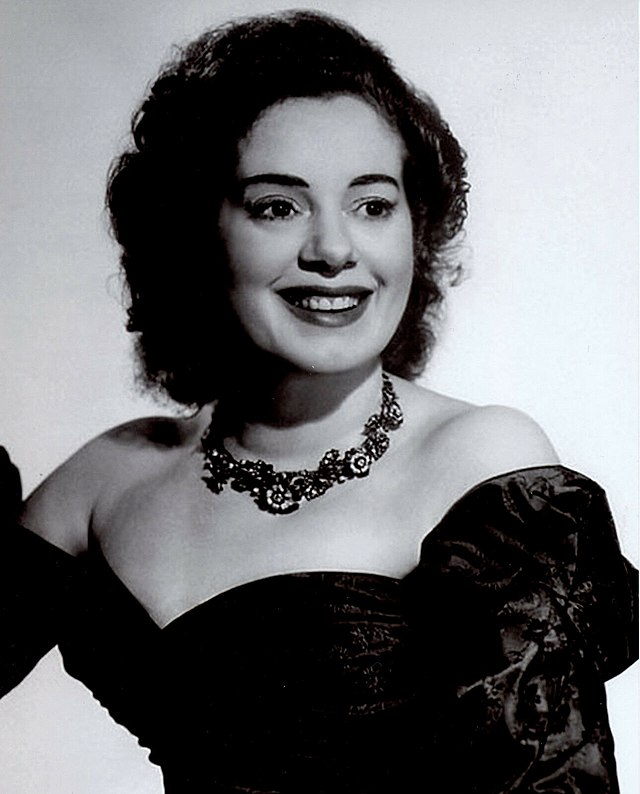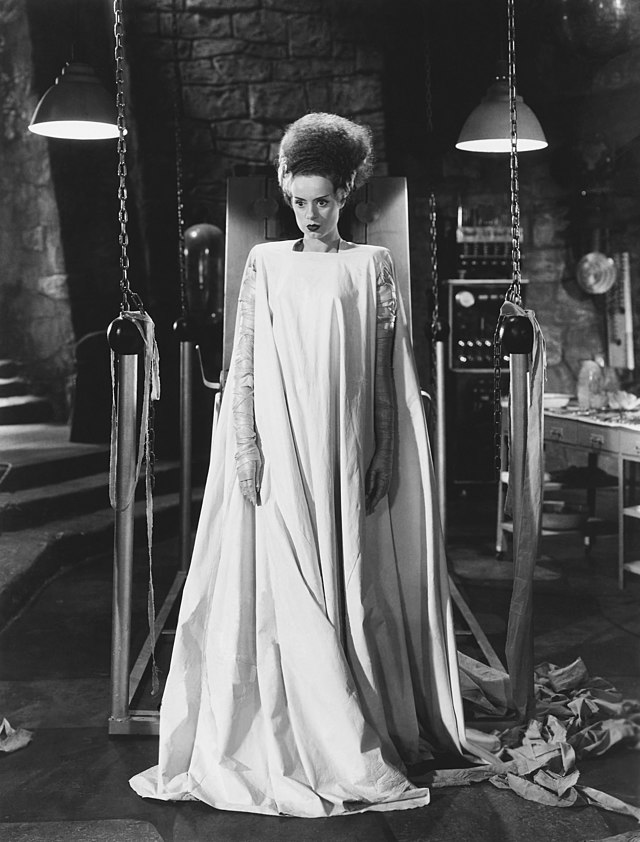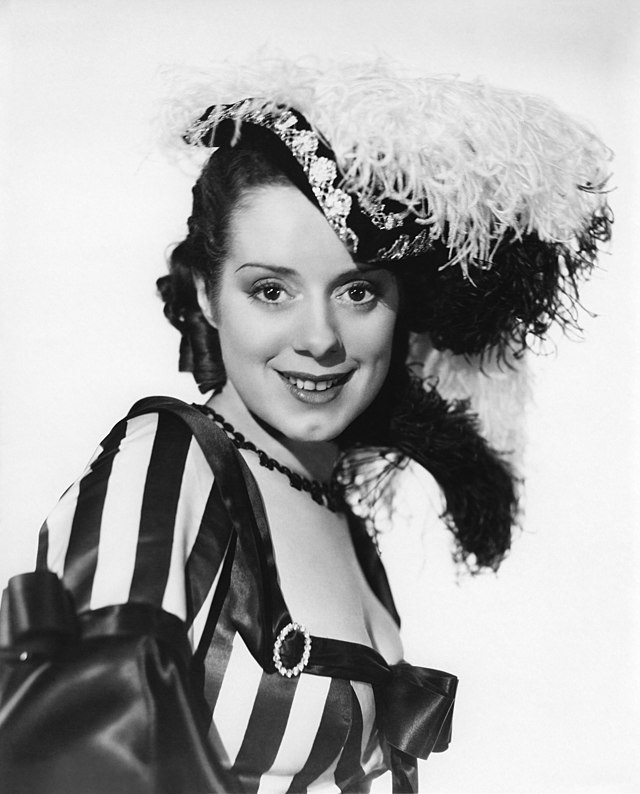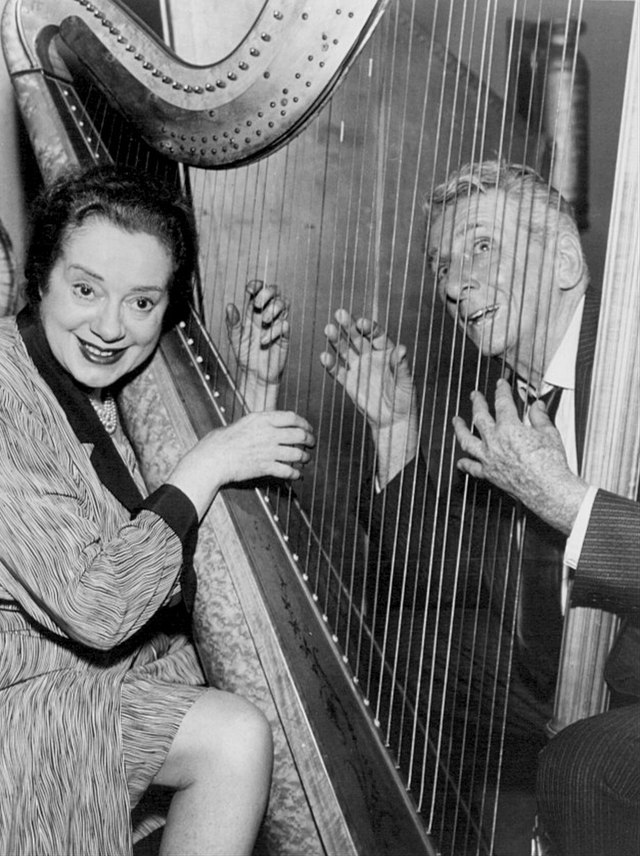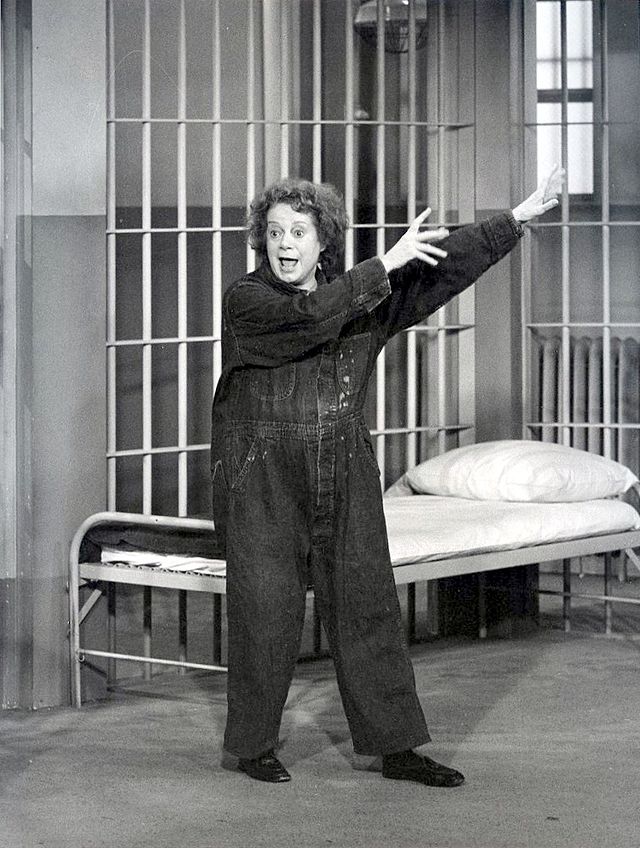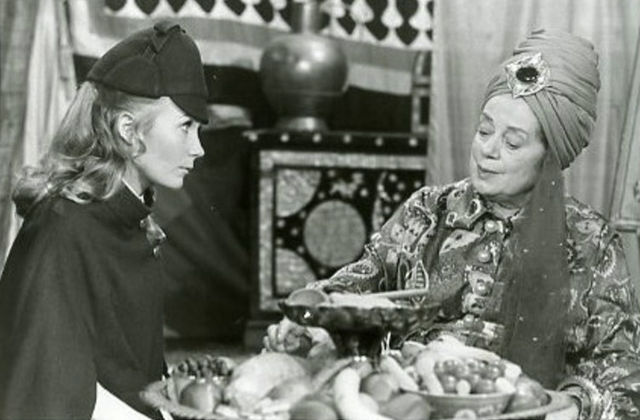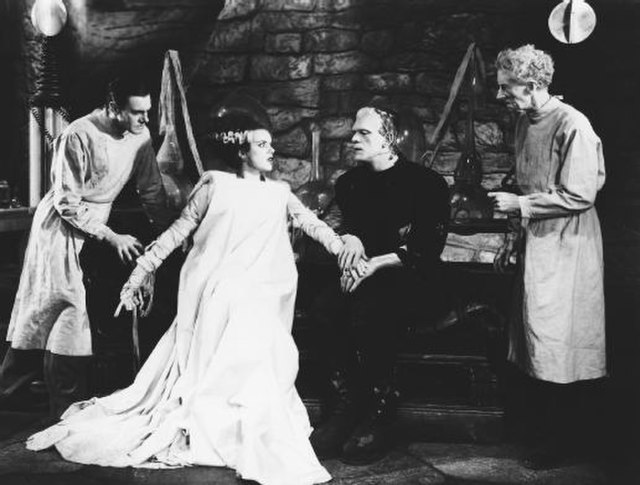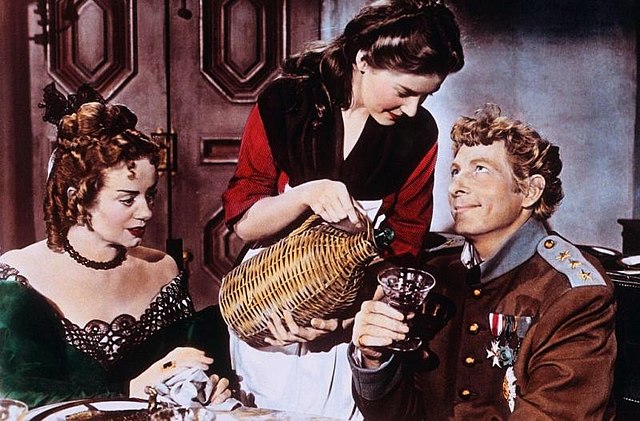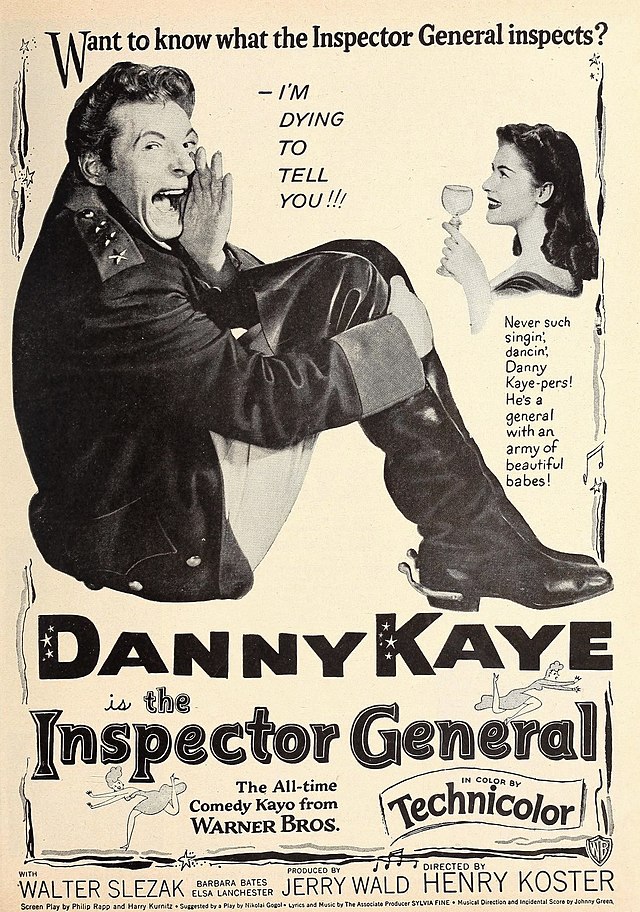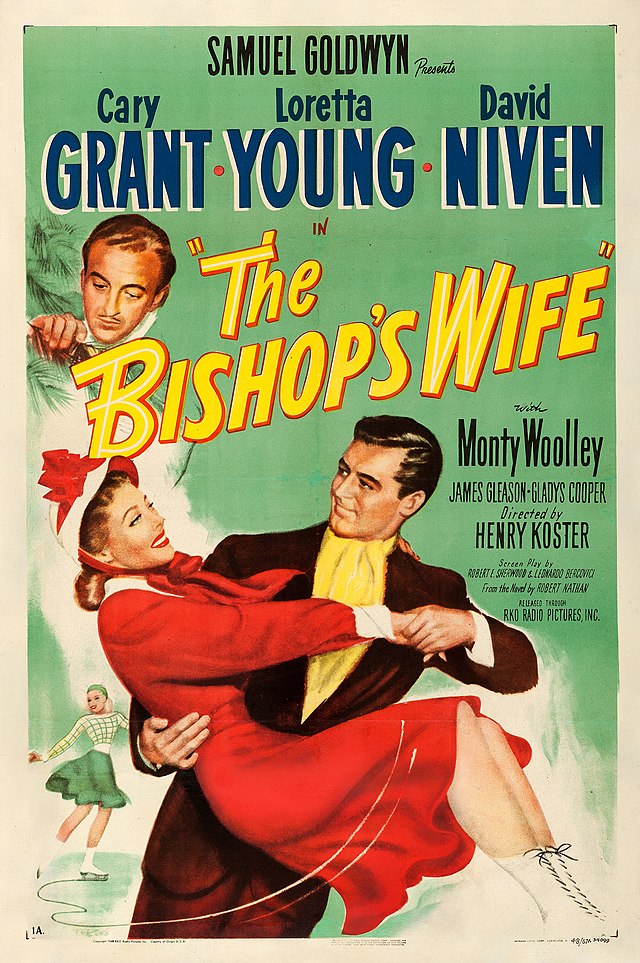Elsa Lanchester
back| Full Name | Elizabeth Lanchester Sullivan |
| Stage Name | Elsa Lanchester |
| Born | October 28, 1902 |
| Birthplace | Lewisham, London, England |
| Died | December 26, 1986 |
| Buried | Cremated at Valhalla Memorial Park Cemetery, North Hollywood, California |
| Married to | Charles Laughton (m. 1929–1962, his death) |
| Children | None |
| Notable films | The Bride of Frankenstein (1935) - Witness for the Prosecution (1957) - The Bishop's Wife (1947) - Mary Poppins (1964) - Bell, Book and Candle (1958) |
Elsa Lanchester
The Eccentric Enchantress
Elsa Lanchester (1902–1986) was a British-born actress known for her eccentric charm and versatility. Her most iconic role came as the Bride in The Bride of Frankenstein (1935), cementing her place in cinematic history.
She married actor Charles Laughton in 1929, and they frequently collaborated on stage and screen. Known for her quirky and comedic performances, Lanchester earned two Academy Award nominations for Come to the Stable (1949) and Witness for the Prosecution (1957), winning a Golden Globe for the latter.
Related
Elsa Lanchester (1902 – 1986)
Biography and Movie Career
Elsa Lanchester, born Elizabeth Lanchester Sullivan on October 28, 1902, in Lewisham, London, England, was a British-American actress who became an iconic figure in Hollywood, best remembered for her role as the "Bride" in The Bride of Frankenstein. Lanchester's career spanned over five decades, and her life was as fascinating and multifaceted as the characters she portrayed.
Early Years and Childhood
Elsa's upbringing was unconventional from the start. Her parents, James Sullivan and Edith Lanchester, were socialists with progressive ideals, and they never married, which was considered scandalous in early 20th-century Britain. Her mother, Edith, was a radical feminist, and both parents were heavily involved in intellectual circles. Elsa's upbringing was filled with political discussions, and she grew up in an environment that prized freedom of thought and self-expression. This bohemian lifestyle had a profound effect on Elsa, fostering her independent spirit and love for the arts.
At the age of 10, Elsa's artistic path began when she joined Isadora Duncan’s dance school in Paris. Duncan’s free-form approach to dance had a lasting influence on Elsa's early career. However, with the outbreak of World War I, her time in France was cut short, and she returned to England. Despite the war, she continued to pursue her passion for the arts, studying dance and later theater.
Early Career and Stage Success
In her early twenties, Lanchester became involved in the avant-garde theater scene in London. She was not only an actress but also a singer, dancer, and performer in experimental and satirical works. She co-founded the Cave of Harmony, a nightclub where she performed her own songs and comedic sketches. This club became a gathering place for artists, intellectuals, and bohemians, establishing Elsa as a vibrant and creative force in London’s cultural scene.
Lanchester's theatrical talents quickly garnered attention. She worked with renowned directors and playwrights of the time and performed in a variety of productions. Her work in comedic and character roles set her apart from more traditional leading ladies, and she was admired for her wit, eccentricity, and charm. Her performances were often infused with a sense of irreverence, making her a popular figure in London's artistic circles.
Meeting Charles Laughton and Marriage
In 1927, while working in theater, Elsa met actor Charles Laughton, who was just beginning his career. They were cast in a production together, and their professional relationship quickly blossomed into a romantic one. Lanchester and Laughton married in 1929 and became one of the most prominent couples in British and later Hollywood cinema. Laughton would go on to become an Academy Award-winning actor, and Elsa frequently worked alongside him, both on stage and screen.
Their marriage, while outwardly affectionate, was complex. Laughton was reportedly homosexual, a fact that Elsa acknowledged later in life. Despite this, the two remained devoted to one another, both personally and professionally. Their deep companionship and mutual respect were the foundation of their long-lasting partnership, even though they never had children. Elsa referred to Laughton as her "greatest love" and stood by him throughout his career, including during his most difficult periods.
Hollywood Career and Rise to Fame
In the early 1930s, Elsa Lanchester and Charles Laughton moved to Hollywood, where they both found success. Lanchester’s breakout role came in 1935 when she was cast as the iconic "Bride" in The Bride of Frankenstein. Though she only appeared on screen for a brief time, her portrayal of the monster’s bride, with her shocked expression and beehive hairdo streaked with white, became one of the most enduring images in cinema history. Her portrayal of both Mary Shelley and the Bride cemented her status as a cult figure and a symbol of classic horror cinema.
Although The Bride of Frankenstein is Lanchester’s most famous role, her career was filled with memorable performances in a variety of genres. She was a versatile character actress, able to play comedic, dramatic, and eccentric roles with equal skill. Some of her notable films include The Private Life of Henry VIII (1933), where she played Anne of Cleves opposite Laughton’s King Henry VIII, and Witness for the Prosecution (1957), in which she played Miss Plimsoll and earned an Academy Award nomination for Best Supporting Actress.
Throughout the 1940s and 1950s, Lanchester was a sought-after supporting actress. She played memorable roles in films such as The Bishop’s Wife (1947), Bell, Book and Candle (1958), and Mary Poppins (1964), where she appeared as Katie Nanna. Her comedic talents were always on display, and she was frequently cast as quirky, eccentric characters that showcased her unique personality and style.
Later Years and Personal Interests
Off-screen, Lanchester was known for her sharp wit, humor, and unorthodox views. She maintained her bohemian outlook throughout her life and never fully conformed to the Hollywood lifestyle. She loved painting and had a deep interest in the arts beyond acting. Elsa was also a talented singer, often performing humorous and satirical songs, many of which she wrote herself. In fact, she recorded several albums of these songs, which became popular with audiences who appreciated her offbeat humor.
Lanchester was also an author and wrote two autobiographies: Charles Laughton and I (1938) and Elsa Lanchester Herself (1983). In these books, she reflected on her career, her marriage to Laughton, and her experiences in Hollywood, offering readers a glimpse into her private world.
Charles Laughton's Death and Her Final Years
In 1962, Lanchester faced a devastating loss when Charles Laughton died of cancer. His death left a void in her life, but she continued to work in film and television. In the 1970s, she appeared in a number of films, including Murder by Death (1976), where she played a parody of Miss Marple. Her performances remained vibrant and engaging even as she aged, and she continued to receive acclaim for her work.
As she entered her later years, Lanchester’s health began to decline. In the early 1980s, she largely retired from acting due to frailty and illnesses. She lived quietly in Los Angeles, maintaining friendships with many in the industry.
Death and Cause of Death
Elsa Lanchester passed away on December 26, 1986, at the age of 84, due to pneumonia, after suffering from a combination of heart problems and illnesses. At the time of her death, she was living at the Motion Picture and Television Country House in Woodland Hills, California, a retirement community for actors. She was cremated, and her ashes were scattered in the Pacific Ocean, in keeping with her free-spirited nature.
Her legacy endures through her distinctive performances, her contributions to the golden age of cinema, and her enduring image as the unforgettable Bride of Frankenstein. Elsa Lanchester remains a beloved figure in film history, celebrated for her talent, her unconventional life, and her vibrant personality.
Elsa Lanchester talks about Charles Laughton
Eccentric Acting Style of Elsa Lanchester
Elsa Lanchester's acting style was uniquely versatile, blending an eccentric charm with sharp wit and an unmistakable flair for the comedic. Her performances were characterized by a keen understanding of character work, as she excelled in bringing quirky, memorable figures to life, often turning what could have been minor or secondary roles into scene-stealing moments. Her ability to blend comedy, eccentricity, and dramatic depth made her a distinctive figure in both British and Hollywood cinema.
Eccentricity and Character Depth
Lanchester’s acting style was rooted in her natural eccentricity. Her upbringing in a bohemian, intellectually free environment allowed her to embrace non-conformity, and this was reflected in the characters she portrayed. Whether playing comedic roles or more serious parts, Lanchester imbued her performances with a certain unpredictability, often surprising audiences with her unconventional choices.
In The Bride of Frankenstein (1935), for instance, though she was on screen for only a few minutes, her portrayal of the Bride is iconic. She captured the creature's innocence and confusion, combined with a barely restrained terror and rage, all in one haunting look. Her physicality in the role, from her birdlike movements to her expressive, wide-eyed stare, created a lasting image that resonates through the annals of horror cinema.
Similarly, in Witness for the Prosecution (1957), where she played the fussbudget nurse Miss Plimsoll, Lanchester managed to convey the character’s comedic fussiness without making her a caricature. Her timing was impeccable, delivering sharp, witty lines with a dry, deadpan humor that contrasted beautifully with the intense courtroom drama unfolding around her.
Comedic Talent and Timing
Lanchester had a natural gift for comedy, using her expressive face, timing, and physicality to great effect. She often played roles with an absurd or quirky edge, and her ability to shift between exaggerated physical humor and subtle, understated comedic expressions allowed her to stand out among her peers. Her sharp, often sardonic delivery was a hallmark of her acting, particularly when playing strong-willed or slightly mad characters.
In films like Passport to Destiny (1944), where she plays an ordinary British woman who embarks on a mission to assassinate Adolf Hitler, Lanchester displayed her ability to balance absurdity with sincerity. She took what could have been an over-the-top farce and played it with enough sincerity that the humor came from the situation rather than from buffoonery. She was never afraid to play characters who were oddballs or outsiders, often using exaggerated mannerisms or gestures to emphasize the comic eccentricity of her roles.
Physicality and Expressiveness
Lanchester was a master of physicality in her performances, using her body to communicate emotions or underscore comedic moments. Her training in dance from a young age gave her a natural grace and physical control, which she employed in various roles to great effect. Whether through stiff postures, like in The Bride of Frankenstein, or wild, energetic movements in her more comedic roles, Lanchester used her body as much as her voice to bring characters to life.
Her expressive face was another key tool in her acting. She could convey a range of emotions—bemusement, exasperation, curiosity, or even silent horror—with just a shift in her eyes or a twitch of her lips. Her eyes were particularly important in her performances; she often used wide, exaggerated gazes to reflect a character's inner confusion or disbelief, as seen in The Spiral Staircase (1945) where she played a somewhat loopy household maid, or in The Bishop's Wife (1947) where her eyes were often the punchline to her exasperation with her employers.
Voice and Speech
Lanchester’s voice was another significant part of her acting arsenal. She had a distinct, almost clipped way of speaking, with a clear British accent that she used to great effect. Her voice could range from soft and genteel to shrill and commanding, depending on the needs of the role. This adaptability helped her navigate both comedic and dramatic roles, lending credibility to her characters even in the most absurd situations.
In Mary Poppins (1964), for instance, she played the no-nonsense nanny, Katie Nanna, whose exasperated tirades are as much a part of the character's humor as her stiff movements. Lanchester’s precise diction, combined with her clipped, almost prim manner of speech, allowed her to bring a comic rigidity to the character, emphasizing her annoyance and impatience.
Subtlety and Layering in Supporting Roles
Lanchester often played supporting roles, but what made her exceptional was her ability to bring layers to even the smallest of parts. She had a talent for making her characters fully realized, even if they only appeared briefly on screen. She never treated any role as insignificant; each character, no matter how eccentric or minor, was treated with the same care and attention to detail. This commitment allowed her to create lasting impressions, often becoming more memorable than the lead actors in a film.
In Bell, Book and Candle (1958), for example, she played Queenie, the mischievous aunt and witch. While the role could have easily been a one-note comic relief, Lanchester imbued Queenie with a sense of history and eccentric charm, turning what could have been a side character into a fully developed persona. She gave Queenie a life of her own, and her scenes were some of the film’s most engaging.
Transformation and Versatility
Lanchester’s greatest strength lay in her versatility. Throughout her career, she transitioned seamlessly between genres, including comedy, drama, horror, and even fantasy. She was a chameleon, able to adapt her acting style to suit the tone of the film. Whether playing an uptight housekeeper, a mad scientist's creation, or a cunning nurse, she could transform herself completely into the character, making it seem as though she belonged in any setting.
Her work in The Private Life of Henry VIII (1933) as the disinterested Anne of Cleves shows her ability to play historical figures with a modern twist, blending humor with an underlying sadness. On the other hand, her comedic roles in films like Murder by Death (1976), where she plays a parody of Agatha Christie’s Miss Marple, demonstrate her skill in delivering broad, satirical performances.
Conclusion
Elsa Lanchester’s acting style was a harmonious blend of eccentricity, sharp wit, physical expressiveness, and remarkable versatility. Whether in horror, comedy, or drama, Lanchester could command attention, transforming even the smallest of roles into unforgettable performances. Her ability to fully inhabit characters, no matter how outlandish or secondary, set her apart as a unique and gifted performer. She remains a beloved figure in film history, her legacy as the unforgettable "Bride" and countless other quirky, lovable characters standing as a testament to her immense talent.
Memorable Quotes from Elsa Lanchester
On Her Acting and Career:
- "My parents were not theatrical at all. They were very bourgeois, except that they had one eccentricity, which was they wouldn't get married."
– Reflecting on her unconventional upbringing, Lanchester often attributed her unique perspective on life to her bohemian parents.
- "I am not a character actress – I am an eccentric."
– Lanchester famously rejected the label of "character actress," instead embracing her eccentricity as a defining trait of her career.
- "I never had any desire to be a star."
– This quote captures Lanchester's pragmatic attitude toward fame. She was more interested in her craft and playing interesting roles than in pursuing stardom.
- "I wasn’t a beauty, so I never became a movie star."
– Lanchester was candid about her unconventional looks and how that shaped her career trajectory, often in quirky or supporting roles rather than as a leading lady.
On Her Iconic Role in The Bride of Frankenstein:
- "The trick in my acting has always been to make people laugh and then make them think."
– Speaking about her approach to acting, this quote underscores how Lanchester loved playing characters that could be funny but also layered with complexity.
- "I was a beauty at 10, a queen at 20, a witch at 40, and a devil at 60."
– Lanchester humorously commented on the evolution of the roles she played throughout her career, noting her transition from youthful beauty to older, often eccentric characters.
- "I never felt it was the best part I ever played."
– Lanchester's modest take on her role as the Bride in The Bride of Frankenstein, despite it being the part she is best remembered for, shows her humility.
On Charles Laughton and Their Marriage:
- "He was everything. He was my husband, my lover, my friend, my critic, my biggest fan, and my worst enemy."
– Lanchester’s reflection on her marriage to Charles Laughton captures the complexity of their long and multifaceted relationship, one built on mutual respect, love, and collaboration.
- "I married Charles Laughton for better or worse. But he had too much of both."
– This humorous take on her marriage to Laughton shows her candid and witty outlook on the ups and downs of their partnership.
- "I don't think I ever understood him, and yet I loved him."
– Lanchester’s thoughts on her husband, acknowledging the complexities of their relationship.
On Hollywood and Life:
- "She looked as if butter wouldn’t melt in her mouth – or anywhere else."
– Describing fellow actress Greta Garbo in her typical cheeky style, showing her humor and sharp tongue.
- "To me, a critic is some ghastly person who is not very good at anything, except being on time at the theatre."
– Lanchester often expressed her disdain for critics in her characteristically blunt way, never one to shy away from poking fun at the industry.
- "Women seem to get more eccentric as they get older."
– A self-reflective comment, Lanchester fully embraced her eccentricity and aging, often using it to her advantage in later roles.
- "In Hollywood, I thought I was large and beautiful. In England, I was small and funny."
– This quote reflects her awareness of how different cultures and film industries viewed her as an actress.
On Growing Older:
-
"I have the most perfect husband. He has no faults. He is so kind, so thoughtful. Not only that, but he is quite beautiful...because he’s dead."
– After Charles Laughton’s death, Lanchester often used her signature wit to address the subject of loss, blending humor with melancholy.
What Others said about Elsa Lanchester
Charles Laughton (her husband and frequent co-star):
- "She has a joy for living. It's something that's rare in people, especially in actors."
– Charles Laughton admired Lanchester for her lively personality and irrepressible spirit. Despite the complexities of their marriage, his affection and admiration for her were well-known. Lanchon also often praised her abilities as an actress, particularly her comedic talents.
- "Elsa is one of the greatest living actresses, though I believe even she underestimates how good she is."
– Laughton publicly praised his wife, frequently acknowledging her talents as an actress, even though Lanchester herself was often modest about her abilities.
Billy Wilder (director of Witness for the Prosecution):
- "Elsa Lanchester was a treasure, a rare jewel in a profession where people tend to do things by the book. She was the book."
– Billy Wilder, who directed Lanchester in Witness for the Prosecution, appreciated her versatility and comedic timing. He recognized that she had the ability to elevate a role with her distinctive style, even in supporting parts.
Agatha Christie (author, after Witness for the Prosecution):
- "Lanchester was a delight, her portrayal of Miss Plimsoll was both unexpected and wonderful."
– Agatha Christie, author of Witness for the Prosecution, was reportedly pleased with Lanchester's portrayal of the quirky nurse in the film adaptation, praising how Lanchester brought humor and charm to the role.
Peter Ustinov (co-star in Witness for the Prosecution):
- "Working with Elsa was like playing a perfectly tuned piano. She hit every note exactly as it should be, and made the whole scene brighter just by being there."
– Ustinov, who acted alongside her in Witness for the Prosecution, admired her ability to play complex comedic roles with precision and lightness, making her scenes unforgettable.
Angela Lansbury (actress and contemporary):
- "Elsa was a unique performer—uncompromising, sharp, and always inventive. She gave so much life to every part she played. I looked up to her as a performer."
– Angela Lansbury expressed her admiration for Lanchester, particularly noting how she brought an intelligent, often unconventional approach to every character she portrayed.
James Whale (director of The Bride of Frankenstein):
- "I knew from the beginning that Elsa would be perfect for the Bride. She has this wonderfully eerie quality about her, a kind of charm that makes her both beautiful and terrifying at the same time."
– James Whale, who directed The Bride of Frankenstein, admired Lanchester’s ability to embody the role of the Bride with her physicality and expression, making the character unforgettable despite limited screen time.
Boris Karloff (co-star in The Bride of Frankenstein):
- "Elsa had a marvelous way of making something out of nothing. Even in a role with barely any dialogue, she could make you remember her long after the credits rolled."
– Boris Karloff, who played Frankenstein’s Monster opposite Lanchester’s Bride, recognized her skill in creating an iconic and memorable performance even with minimal screen presence.
Leonard Maltin (film critic and historian):
- "Elsa Lanchester was one of those rare performers who could steal a scene without effort. She had that magical blend of humor, eccentricity, and intelligence that made her a standout in every film."
– Leonard Maltin praised Lanchester’s ability to shine in even the smallest of roles, pointing out her exceptional gift for scene-stealing performances.
Vincent Price (actor and horror icon):
- "She was the queen of the oddballs, and I mean that with the highest respect. Elsa knew how to be weird without being silly, and that's what made her a genius."
– Fellow horror icon Vincent Price admired Lanchester’s ability to embrace her eccentricity, particularly in genre films like The Bride of Frankenstein and The Spiral Staircase.
Jessica Marple (journalist, after Lanchester’s passing):
- "There are few actresses who could walk the tightrope between comedy and tragedy as Elsa Lanchester did. She was a true original in an industry that often demands conformity."
– Jessica Marple, a critic, and journalist, summed up Lanchester’s career with admiration for her ability to balance humor and deeper emotional tones in her roles.
Tim Burton (director, speaking about Lanchester’s influence):
- "Elsa Lanchester’s performance in The Bride of Frankenstein was an early inspiration for me. Her ability to be both grotesque and beautiful in the same breath—that's what I wanted in my characters."
– Filmmaker Tim Burton has often cited Lanchester as an influence, particularly her ability to portray characters that exist on the edges of reality, embracing the odd, macabre, and otherworldly.
Final Thoughts:
Elsa Lanchester was widely regarded as a unique, irreplaceable talent. Her peers and those who worked with her admired her for her intelligence, wit, and ability to take on eccentric, often unusual roles with great depth and sincerity. Whether in comedies, dramas, or horror films, she left a lasting impression on the film industry, inspiring both her contemporaries and future generations of performers.
Awards and Recognition
Academy Award Nominations:
Although Lanchester never won an Oscar, she received two Academy Award nominations for Best Supporting Actress:
- 1958 – "Witness for the Prosecution"
Elsa Lanchester was nominated for her role as Miss Plimsoll, the devoted yet comical nurse in this courtroom drama directed by Billy Wilder. Her portrayal, full of humor and charm, earned her wide recognition and her first Oscar nomination. - 1949 – "Come to the Stable"
Lanchester was nominated for her role as Amelia Potts, a quirky artist who allows two French nuns to stay in her house. Her performance brought out both her comedic flair and her ability to humanize eccentric characters.
Golden Globe Award:
- 1958 – "Witness for the Prosecution"
Lanchester won a Golden Globe Award for Best Supporting Actress in recognition of her memorable performance in Witness for the Prosecution. This role is one of her most celebrated, and the Golden Globe win further solidified her reputation as a talented character actress.
Other Recognitions:
Though formal awards were fewer for Lanchester compared to her illustrious career, she earned widespread recognition in several other ways:
- "Bride of Frankenstein" Recognition
Her role as the Bride in The Bride of Frankenstein (1935) remains one of the most iconic and enduring images in cinematic history, particularly in the horror genre. While she did not receive formal accolades for the role at the time, it has since become a legendary portrayal, celebrated in film retrospectives and horror festivals. The American Film Institute included her performance as the Bride as one of the top 100 greatest movie characters in American cinema, underscoring her enduring impact. - British Academy Film Awards (BAFTA)
Lanchester received several BAFTA nominations during her career, though not as prominently recognized as in the U.S. She remained well-regarded in her native Britain and was considered one of the great British-born actresses to succeed in Hollywood. - Television Career
In her later career, Elsa appeared frequently on television shows, including The Man From U.N.C.L.E. and The Name of the Game. While these did not result in major award wins, she was consistently recognized for her ability to transition between film and TV, making her a beloved figure on both small and large screens.
Legacy and Honors:
While not awarded as frequently as some Hollywood stars, Elsa Lanchester's legacy is marked by the lasting impact of her roles. Her performances, especially as the Bride of Frankenstein and Miss Plimsoll, have earned her a permanent place in the annals of film history. She has been honored in many retrospectives and film festivals celebrating classic horror and character acting.
- Star on the Hollywood Walk of Fame
In recognition of her contributions to the film industry, Elsa Lanchester received a star on the Hollywood Walk of Fame at 6844 Hollywood Boulevard. This honor reflects her lasting influence on the film world and her status as an iconic figure in Hollywood history. - Cultural and Genre Festivals
Her work, especially in horror and classic cinema, is regularly featured at film festivals, genre-specific conventions, and in critical retrospectives. Elsa Lanchester is often celebrated as a cult icon, particularly for her role in The Bride of Frankenstein, where her portrayal as the Bride continues to be an inspiration for generations of actors and filmmakers in the horror genre.
Movies with Elsa Lanchester
1920s
- 1927 – One of the Best
Lanchester plays a minor role in this British drama about a soldier accused of cowardice during World War I.
1930s
- 1930 – The Tonic
A short British comedy film in which Lanchester plays a character seeking a magical cure-all tonic. - 1931 – Potiphar's Wife
A silent film based on the biblical tale of Joseph and Potiphar's wife, in which Lanchester appears in a minor role. - 1933 – The Private Life of Henry VIII
Lanchester plays Anne of Cleves, one of Henry VIII's wives, in this comedic portrayal of the infamous English monarch. Her performance was charming and humorous, contrasting with her husband Charles Laughton's portrayal of Henry VIII. - 1933 – The Constant Nymph
A romantic drama centered on a love triangle between a composer, his wife, and a young girl who adores him. Lanchester appears in a supporting role. - 1935 – The Bride of Frankenstein
Elsa Lanchester plays the dual roles of Mary Shelley and the Bride, the iconic creation of Dr. Frankenstein's monster. Her portrayal of the Bride, with her iconic hairstyle, became legendary despite the short screen time. - 1935 – David Copperfield
Lanchester appears as Clickett in this adaptation of Charles Dickens’ novel, playing a small, comedic role in this well-loved British film. - 1936 – Rembrandt
In this biographical film about the famous Dutch painter Rembrandt, Lanchester plays Hendrickje, a maid who becomes Rembrandt's partner and muse. - 1936 – Ladies in Love
A romantic comedy featuring three women in search of love in Budapest, Hungary. Lanchester plays a supporting role in this ensemble film. - 1937 – The Beachcomber
Set on a tropical island, this comedy-drama follows a disreputable drunk (played by Charles Laughton) who meets a missionary. Lanchester has a minor role as Martha Jones. - 1938 – Sidewalks of London
Lanchester portrays a street performer in this British drama, which follows various performers in London’s West End. - 1939 – The Spy in Black
In this World War I espionage thriller, Lanchester has a minor role in a film about a German U-boat captain who becomes involved in a British spy plot.
1940s
- 1940 – The Bishop's Wife
Lanchester plays Matilda, the Bishop's housemaid, in this charming Christmas fantasy about an angel (played by Cary Grant) who helps a struggling bishop. - 1941 – Come Live with Me
A romantic comedy about a Hungarian refugee (Hedy Lamarr) who marries an American writer to avoid deportation. Lanchester plays the eccentric maid Anna. - 1942 – Tales of Manhattan
An anthology film with five different stories centered around a formal tailcoat that travels from one owner to another. Lanchester plays a supporting role. - 1943 – Forever and a Day
A wartime film chronicling the history of a London house from its construction in the 18th century to its near-destruction in World War II. Lanchester has a small role. - 1944 – Passport to Destiny
Lanchester stars as a determined British cleaning lady who decides to assassinate Adolf Hitler in this quirky wartime comedy. - 1945 – The Spiral Staircase
A psychological horror film in which a serial killer targets disabled women. Lanchester plays the quirky Mrs. Oates, the household maid. - 1947 – The Razor's Edge
Lanchester has a small role as Miss Keith, a gossipy socialite, in this adaptation of W. Somerset Maugham’s novel about a man searching for spiritual meaning after World War I. - 1947 – The Bishop's Wife
Lanchester reprises her role as Matilda, the housemaid, in this heartwarming Christmas classic.
1950s
- 1950 – The Secret Garden
A film adaptation of the classic children's novel by Frances Hodgson Burnett. Lanchester plays Martha, one of the household servants. - 1950 – Mystery Street
Lanchester plays Mrs. Smerrling, a landlady with a dark secret, in this film noir about a forensic investigation into a murder. - 1950 – Witness for the Prosecution
In this courtroom drama directed by Billy Wilder, Lanchester plays Miss Plimsoll, the nurse attending to Sir Wilfrid, a defense attorney. Her comedic role earned her an Academy Award nomination for Best Supporting Actress. - 1951 – Les Misérables
Lanchester plays Madame Magloire in this adaptation of Victor Hugo’s classic novel about redemption and justice. - 1955 – Bell, Book and Candle
Lanchester plays Queenie Holroyd, a mischievous witch in this romantic fantasy comedy. The film follows a modern-day witch who uses her powers to charm a mortal man. - 1957 – The Big Clock
Lanchester plays the eccentric painter Louise Patterson in this thriller about a magazine editor who becomes entangled in a murder investigation. - 1959 – Murder, She Said
In this adaptation of Agatha Christie's 4.50 from Paddington, Lanchester plays Miss Marple, who investigates a murder witnessed from a train.
1960s
- 1964 – Mary Poppins
Lanchester plays Katie Nanna, the strict and disgruntled nanny at the beginning of this beloved Disney musical. - 1965 – That Darn Cat!
Lanchester plays Mrs. MacDougall in this Disney comedy about a cat who helps solve a kidnapping.
1970s
- 1976 – Murder by Death
A comedy mystery film that parodies famous detective characters. Lanchester plays Jessica Marbles, a spoof of Agatha Christie’s Miss Marple.
1980s
- 1980 – Die Laughing
In this crime-comedy film, Lanchester has a small role as Sister Hildegarde.

